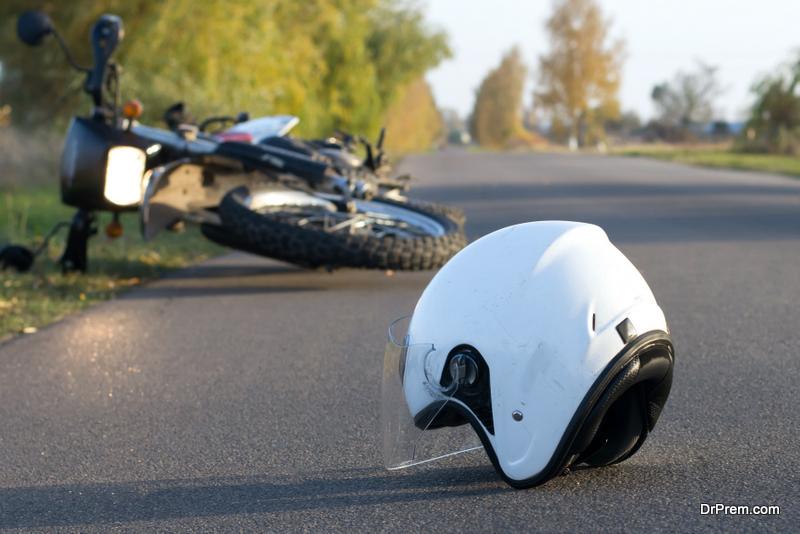Motorcycle accidents can be traumatic and life-altering events. They can cause severe physical injuries, emotional distress, and financial difficulties. If you’re involved in a motorcycle accident, it’s essential to know what steps to take to protect yourself and your legal rights.
Motorcycle Accident Statistics & Data
While motorcycles only make up 3 percent of all registered vehicles in the United States (and just 0.6 percent of all vehicle miles traveled), they comprise 14 percent of all traffic fatalities. This factor is directly related to the increased danger of being involved in an accident with limited safety equipment and mechanisms.
Unfortunately, things don’t seem to be getting any safer for motorcyclists. Fatalities among riders increased by a whopping 8 percent from 2020 to 2021. And when you look at the past 10 years, deaths have increased by 19 percent. In terms of injuries, that number increased by 5 percent from 2020 to 2021.
What to Do if You Become a Statistic
The best thing you can do is avoid putting yourself in high-risk scenarios where motorcycle accidents are most likely to happen. (For example, avoid riding in the dark or during inclement weather.) But should you find yourself involved in an accident, the next best thing is to have a smart response plan.
Here are several tips:
1. Seek Medical Attention Immediately
Even if you feel okay after the accident, it’s imperative that you seek medical attention as quickly as you can. Motorcycle accidents can cause hidden injuries that may worsen over time if left untreated. Additionally, seeking medical attention can help you document your injuries, which can be crucial if you decide to pursue legal action. Make sure to follow your doctor’s orders and attend all follow-up appointments.
2. Call the Police
If you haven’t already, call the police to report the accident. Even if the accident doesn’t seem like a big deal, it’s essential to document it with a police report. When the police arrive, make sure to provide them with accurate and detailed information about the accident. Additionally, ask for a copy of the police report for your records.
3. Document the Accident Scene
Take as many pictures and videos of the accident scene as you can, including your motorcycle, any other vehicles involved, and the surrounding area. If possible, get the contact information of any eyewitnesses who may have seen the accident. All of this documentation can be valuable evidence if you decide to pursue legal action.
4. Contact Your Insurance Company
Report the motorcycle accident to your insurance company as soon as you’re in a stable enough condition to do so. Provide them with accurate and detailed information about the accident, including any injuries or damages. Your insurance company will likely start an investigation into the accident, so it’s essential to cooperate with them fully.
5. Seek Legal Representation
Consider hiring a motorcycle accident lawyer to protect your legal rights and pursue any compensation that you’re owed for your injuries and damages. Motorcycle accidents can be complex, and a personal injury lawyer can help you navigate the legal process.
Your lawyer can also help you collect evidence, engage in negotiations with insurance companies, and represent you if your case goes to court. (Insurance companies often try to incorrectly point the finger at motorcyclists for being irresponsible. Your attorney can stop them from pushing this narrative and force them to use the facts.)
6. Keep Track of Your Medical Expenses
Keep track of your medical expenses and other damages, including lost wages and property damage. This documentation can be crucial when seeking compensation for your injuries and damages.
When seeing a doctor or having a procedure performed, be sure to request detailed/itemized bills. The more information you have on your side, the better your chances are of getting full compensation for your injuries.
7. Follow Your Doctor’s Orders
Make sure to follow your doctor’s orders and attend all follow-up appointments. Failure to do so could harm your health and your legal case. You might think you’re getting better, but don’t stop the treatment plan as soon as you regain your energy or range of motion. Medication and treatment plans should be continued until your medical team says to stop.
8. Be Proactive With Your Recovery
There are dozens of aspects of a motorcycle accident that you have no control over. However, you should spend your time and energy focusing on the ones you can influence. Be proactive with your recovery by surrounding yourself with the right people. Good luck, and feel better!
Article Submitted By Community Writer




